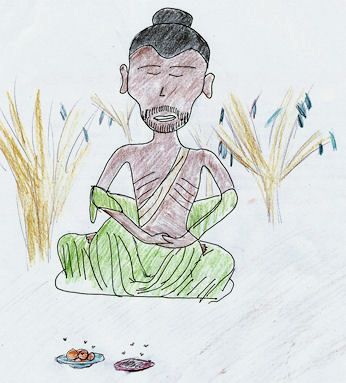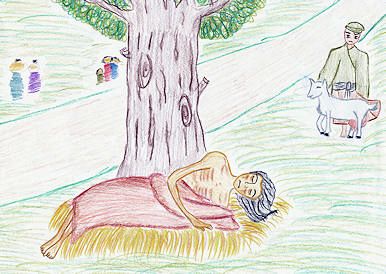
Xīdá-duō tried all these things, hoping for a Great Awakening.
Drawing by Aaron Tse, Earl Warren College (UCSD), Class of 2010, by permission
In India in those days, as in our days, there were a great many people who left their families and lived by begging in order to practice religious austerities, hoping for a better future. Many of them reasoned that, since every act, voluntary or involuntary, represented bondage to the physical body, freedom from the suffering of the human condition must lie in total inactivity.

Others tried to eat a little less every day until they could live on nothing at all. Some stood always on one leg or held a hand always to heaven until it withered for lack of blood. Others clasped their hands at all times or slept on beds of thorns or nails.
Xīdá-duō tried all these things, hoping for a Great Awakening.
When he came to the village of Yōulóu-pínluó 优楼频螺 in the land of Mójiē-tuó 摩揭陀 there was a peaceful grove for meditation. The adjacent hamlet of Xī-nuóní 西那尼 was an excellent place to beg. So he settled here to practice austerities. With him came the five mendicant seekers, who had originally been sent by his father to bring him home.
They recognized Xīdá-duō's superiority, and they knew he was more likely than they to experience the True Awakening (zhèngjué), and they hoped that when this happened, he would be able to teach them the True Principle (zhēnlǐ 真理) of Awareness (juéwù 觉悟).
Xīdá-duō sat in meditation and starved himself. One day he was too weak to stand up and finally passed out from lack of food and drink.

A shepherd boy came by and thought he was dying of starvation, and he ran to spread the word that Xīdá-duō had not eaten for days and was about to die of starvation. He rushed home and fetched a goat who had given birth and had milk to give, and he brought her to Xīdá-duō and forced some of her milk between his lips.
Gradually Xīdá-duō regained consciousness. He realized that had it not been for the shepherd boy, he would have died. The shepherd, delighted at the prospect of accumulating merit by having revived a holy man, returned to his stable, resolved to provide milk regularly to the ascetics.
Xīdá-duō, meanwhile, continued to sit in meditation. At nightfall he heard a group of girls come from the village to sing to him. As he listened it occurred to him that all his self-mortification was likely to lead to his death before it would lead to the True Awakening. It therefore could not possibly be the correct road to follow.
He resolved to stop these extreme deprivations, and go out to beg each morning once again. The five seekers who accompanied him were disgusted at his decision and resolved to have no more to do with him. They headed off to a place called the Deer Park (Lùyě Yuàn 鹿野怨), not far from the town of Bōluó-nài 波罗奈.